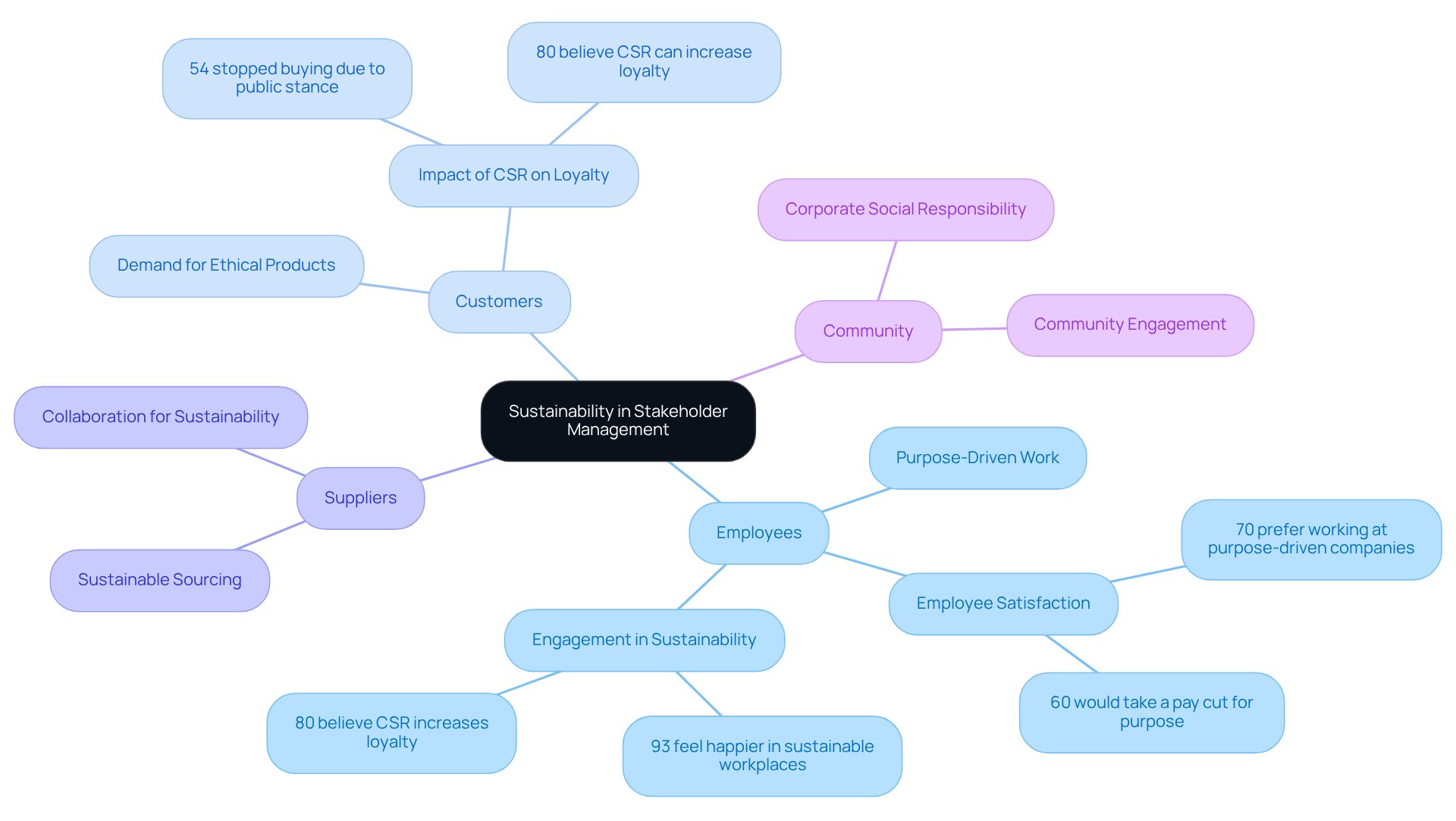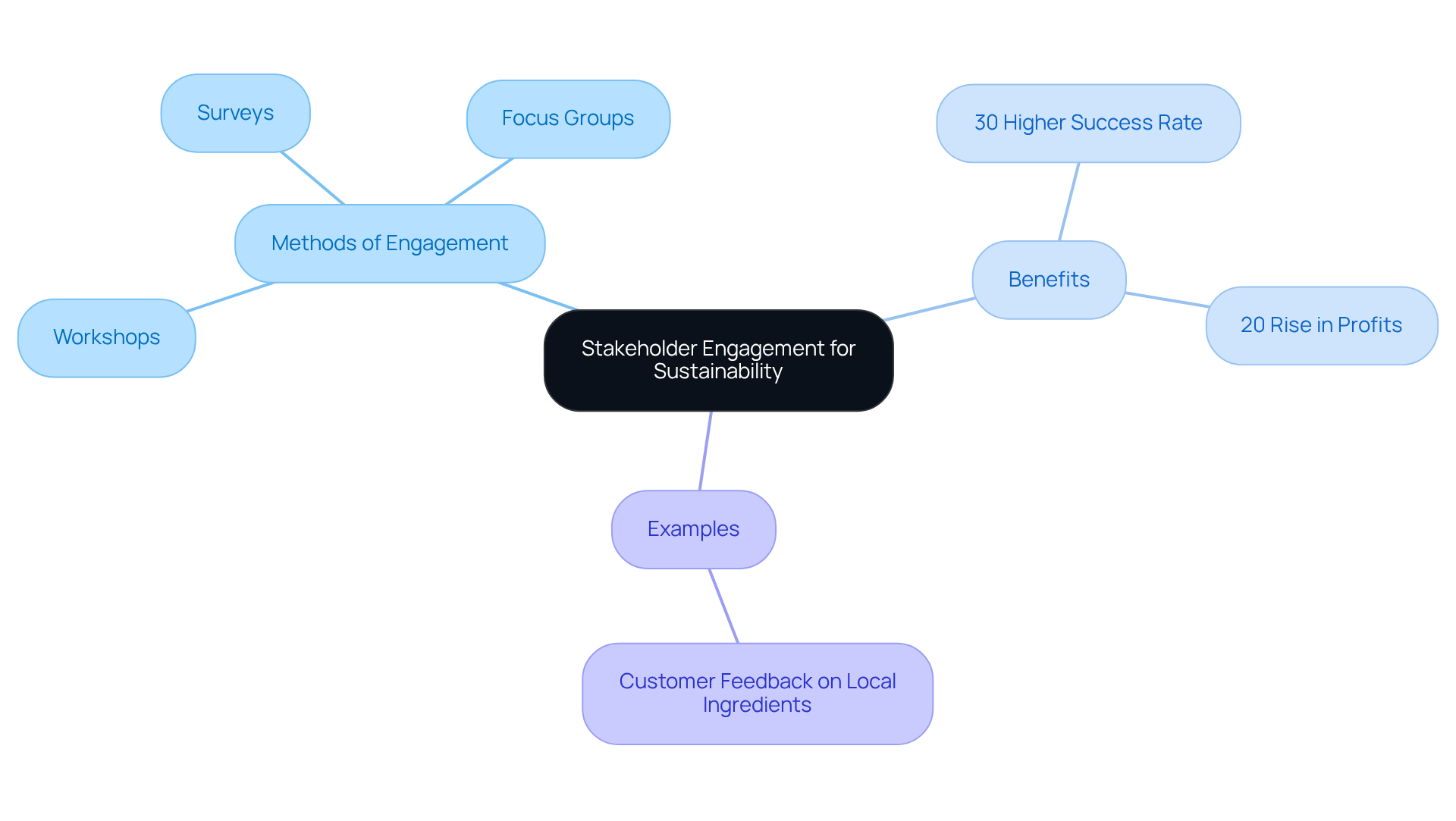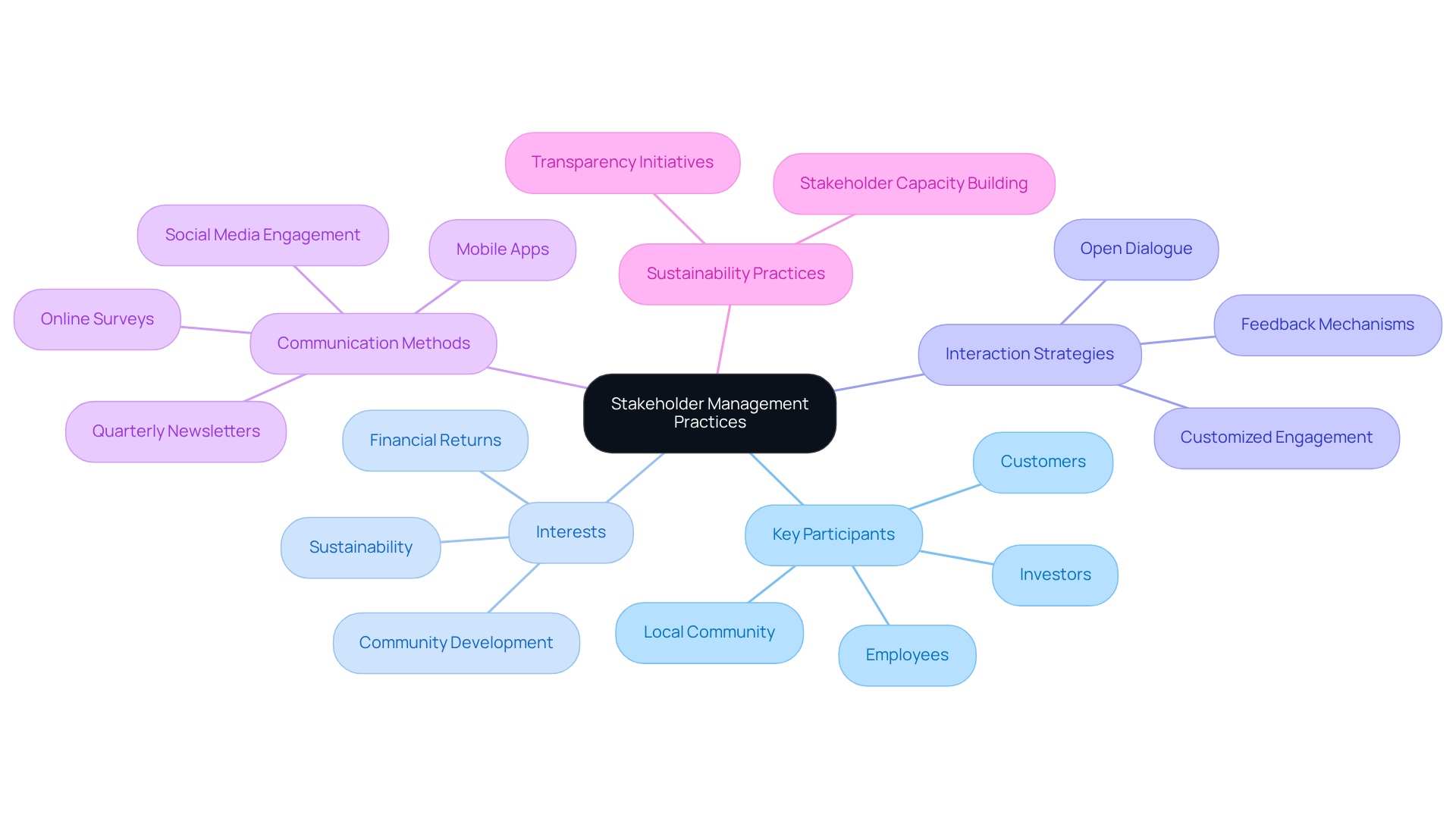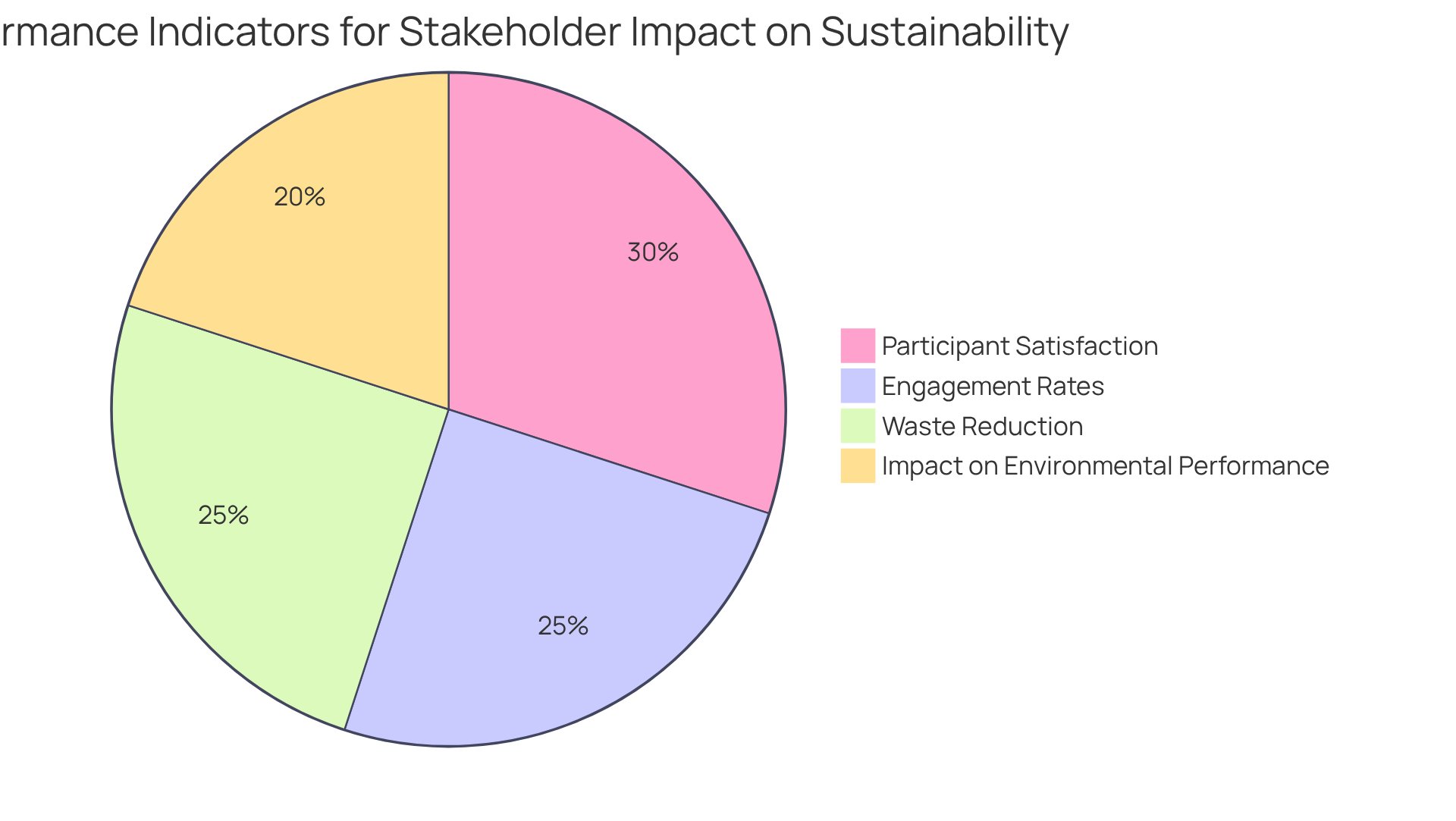Overview
This article delineates four pivotal strategies for the effective integration of sustainability into stakeholder management. It underscores the necessity of balancing the diverse needs of stakeholders while fostering long-term environmental and economic viability. By illustrating how businesses that actively engage stakeholders through strategic communication and customized practices can enhance their brand reputation and customer loyalty, the article demonstrates that such engagement leads to tangible improvements in sustainability metrics and overall performance. Consequently, organizations are urged to adopt these strategies, not only to elevate their operational standards but also to contribute positively to the broader community.
Introduction
The intricate relationship between sustainability and stakeholder management has become a cornerstone for successful businesses in today’s market. As organizations strive to balance the diverse expectations of employees, customers, and the community, they uncover opportunities that not only enhance their brand reputation but also foster trust and collaboration among all parties involved. However, the challenge lies in effectively engaging stakeholders and measuring their impact on sustainability initiatives—how can companies ensure that their efforts resonate with the very groups they aim to serve? This article explores four strategic approaches that can bridge this gap, driving both environmental responsibility and stakeholder satisfaction in a rapidly evolving landscape.
Define Sustainability in Stakeholder Management
The principles of sustainability and stakeholder management necessitate a careful balance of the diverse needs and expectations of groups such as employees, customers, suppliers, and the community, all while ensuring long-term environmental and economic viability. This comprehensive approach to sustainability and stakeholder management creates value not only for shareholders but for all stakeholders involved, fostering trust and collaboration.
For instance, a retail business that emphasizes sustainable sourcing can significantly enhance its brand reputation and meet the growing consumer demand for ethical products. This strategy not only benefits the business but also aligns with the interests of stakeholders; nearly 70% of employees express a preference for working at companies with a strong purpose, while 60% would accept a pay cut to work at a purpose-driven organization.
Furthermore, 80% of leaders believe that a shared goal can enhance customer loyalty, and 84% feel that corporate social responsibility (CSR) impacts an organization’s capacity for change, underscoring the tangible advantages of integrating sustainability and stakeholder management into the management of interested parties.
Businesses that adeptly navigate sustainability and stakeholder management are more likely to thrive in a dynamic market environment, where environmental responsibility is increasingly viewed as a necessity rather than an option. Additionally, 54% of consumers have stopped purchasing from a company due to its public stance on an issue, highlighting the consequences of neglecting the expectations of interested parties.
A notable example is Unilever's Sustainable Living Plan, which illustrates how the incorporation of eco-friendliness into business practices can enhance sustainability and stakeholder management, resulting in greater engagement from interested parties and an improved brand reputation.

Engage Stakeholders to Enhance Sustainability Efforts
To strengthen eco-friendly initiatives, companies must prioritize sustainability and stakeholder management by ensuring the active involvement of interested parties through regular communication, feedback systems, and joint projects. Statistics indicate that companies engaging with stakeholders are 30% more likely to succeed with new products, underscoring the criticality of this engagement. This involvement can take various forms, including:
- Arranging workshops
- Conducting surveys
- Leading focus groups to gather valuable insights on eco-friendly practices
For instance, a restaurant chain could solicit customer feedback on menu items featuring locally sourced ingredients, aligning its offerings with consumer preferences while promoting sustainable practices. Moreover, involving employees in environmental initiatives fosters a culture of responsibility and creativity, ultimately resulting in more efficient and enduring outcomes throughout the organization. Studies show that businesses that successfully interact with interested parties can experience a 20% rise in profits, illustrating the tangible advantages of such approaches. By incorporating viewpoints from interested parties, companies can enhance their eco-friendly strategies and foster significant change. As highlighted by the Project Management Institute, 'Incorporating sustainability and stakeholder management is essential for achieving goals, such as reducing carbon emissions, conserving resources, and promoting social equity.

Implement Effective Stakeholder Management Practices
Effective management practices begin with identifying key participants and understanding their interests, followed by the development of customized interaction strategies. Companies should create a participant map to visualize relationships and prioritize engagement efforts. Moreover, frequent updates on environmental initiatives and progress can foster transparency and trust.
For instance, a hospitality company could introduce a quarterly newsletter to inform interested parties about its environmental accomplishments and upcoming objectives.
By promoting open dialogue and demonstrating a commitment to sustainability and stakeholder management, organizations can strengthen relationships with stakeholders and enhance their overall performance in ecological practices.

Measure Stakeholder Impact on Sustainability Metrics
To effectively assess the influence of interested parties on environmental metrics, organizations must establish clear Key Performance Indicators (KPIs) that encapsulate both participant involvement and ecological outcomes. This includes metrics such as:
- Participant satisfaction scores
- Engagement rates in eco-friendly initiatives
- Overall impact on environmental performance
For instance, a small manufacturing firm could monitor the reduction in waste generated due to employee-led recycling programs. By thoroughly analyzing these metrics, businesses can pinpoint areas for improvement and refine their strategies accordingly. This proactive approach ensures that sustainability and stakeholder management consistently drive meaningful outcomes.

Conclusion
The integration of sustainability into stakeholder management is not merely a trend; it is a fundamental necessity for businesses striving for long-term success. By recognizing the diverse needs of stakeholders—ranging from employees to customers—organizations can create value that benefits all parties involved. This holistic approach fosters trust and collaboration, ultimately leading to improved brand reputation and enhanced customer loyalty.
Key strategies, such as:
- Engaging stakeholders through active communication
- Implementing effective management practices
- Measuring the impact of stakeholder involvement on sustainability metrics
are crucial. These practices not only help businesses align their operations with stakeholder expectations but also enhance their overall performance in ecological initiatives. The examples provided, such as Unilever's Sustainable Living Plan and the potential benefits of stakeholder engagement, illustrate the tangible advantages of prioritizing sustainability.
Reflecting on these insights, it becomes clear that businesses must adopt a proactive stance towards sustainability and stakeholder management. By doing so, they can navigate the complexities of today's market and contribute positively to environmental and social outcomes. Embracing these strategies will fulfill corporate responsibilities and position organizations as leaders in sustainability, paving the way for a more resilient and equitable future.
Frequently Asked Questions
What is the definition of sustainability in stakeholder management?
Sustainability in stakeholder management involves balancing the diverse needs and expectations of various groups, such as employees, customers, suppliers, and the community, while ensuring long-term environmental and economic viability.
How does sustainability impact brand reputation?
Emphasizing sustainable sourcing can significantly enhance a retail business's brand reputation and meet the growing consumer demand for ethical products.
What do employees think about working for purpose-driven companies?
Nearly 70% of employees express a preference for working at companies with a strong purpose, and 60% would accept a pay cut to work at a purpose-driven organization.
How does shared goals influence customer loyalty?
80% of leaders believe that having a shared goal can enhance customer loyalty.
What is the impact of corporate social responsibility (CSR) on organizations?
84% of leaders feel that CSR impacts an organization’s capacity for change, highlighting the advantages of integrating sustainability into management practices.
Why is environmental responsibility becoming essential for businesses?
Businesses that effectively manage sustainability and stakeholder interests are more likely to thrive in a market where environmental responsibility is increasingly viewed as a necessity.
What percentage of consumers have stopped purchasing from a company due to its public stance on an issue?
54% of consumers have stopped purchasing from a company because of its public stance on an issue, indicating the importance of meeting stakeholder expectations.
Can you provide an example of a company successfully integrating sustainability into its practices?
Unilever's Sustainable Living Plan is an example of how incorporating eco-friendliness into business practices can enhance sustainability and stakeholder management, leading to greater engagement and an improved brand reputation.




